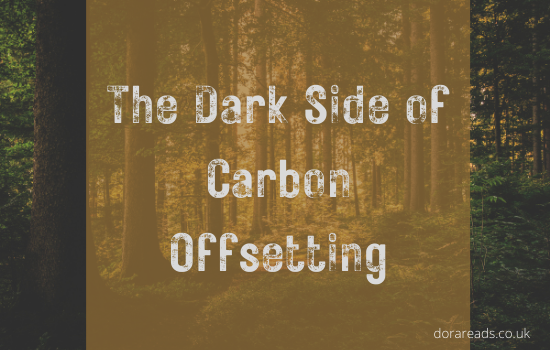Carbon offsetting is sadly not the get-out-of-eco-jail-free card that some people think it is.
Whether you're a frequent flyer looking to make up for the environmental sins of your trips around the world, a heavy-polluting fossil-fuel-based corporation, or just someone who gets their Etsy packages delivered, you've probably heard of carbon offsetting.

But, so that we're all on the same page: what is carbon offsetting?
Well there's no concrete definition - everyone has their own ideas of what 'counts' as carbon offsetting and what doesn't - but I can give you the basics.
Carbon offsetting, as far as I understand it, is where someone - sometimes an individual, but more commonly a business or organisation - attempts to counteract their carbon footprint by supporting environmental projects.
This support often comes in the form of... (paying to make the problem go away) ...investing.
This might be an investment in a green energy scheme, such as a wind farm or tidal energy project...
...But one of the most common is planting trees.
Which is... fine.
I like trees. You like trees. We all like trees.
But it's more complicated than that. Because it always is, isn't it?
Putting it simply: the tree-planting is a common form of greenwashing.
Greenwashing is making something - again, usually a business or organisation - seem more environmentally-friendly than it actually is.
In fact, sometimes, in practice, carbon-offset tree-planting does more harm than good.

Let's start with the basics: planting trees does not reduce your carbon footprint.
...Or at least, not as much as you think it does.
Alia Al Ghussain, writing for the Greenpeace UK blog, says:
'A newly-planted tree can take as many as 20 years to capture the amount of CO2 that a carbon-offset scheme promises. We would have to plant and protect a massive number of trees for decades to offset even a fraction of global emissions. Even then, there is always the risk that these efforts will be wiped out by droughts, wildfires, tree diseases and deforestation.
When trees and plants die, whether from fires or logging or simply old age, most of the carbon they have trapped in their trunks, branches and leaves returns to the atmosphere. Changes in the climate mean that droughts and higher temperatures will strain forests in the future. The risk is that trees planted as part of offsetting projects could become a source of emissions if they die prematurely. Carbon “stored” in trees or other ecosystems is not the same as fossil carbon left underground.'
...That means we're using more carbon than we could practically and feasibly 'make up for' just by planting trees.
It doesn't mean we should stop planting trees - just that it's not enough, and pretending it ever will be enough is just fooling ourselves.

The main reason that planting trees isn't enough is that everyone's still using the carbon in the first place.
It's like medieval indulgences or something.
And for those of you who didn't do The Reformation as part of A-level History, lemme explain:
When the Catholic church was all-powerful here in Europe, they had numerous ways of making extra cash.
One of these was something called an indulgence - not to be confused with the current practice of the same name and origin; medieval ones were extra... extra. (i.e. corrupt as hell and mostly in it for the cash.)
An indulgence was something that you could buy for yourself or a loved one to reduce the amount of time you had to hang around in purgatory (for those not familiar, purgatory's like heaven's highly unpleasant waiting room.)
They literally wrote-off 'sins' that the person had committed in exchange for a donation to - you guessed it! - the Catholic church.
The worse the sin, the bigger the donation.
And if you were planning on a big weekend of sinning?
You could buy pre-emptive indulgences - like a free pass for debauchery, so long as you paid enough.
In my oh-so-humble opinion, a lot of companies use carbon offsetting as indulgences for their eco-sinning.
And, just like indulgences, that means that people are doing whatever the hell they want, so long as they've got the cash to make it go away.
Just an opinion, of course.
Guardian columnist George Manbiot shared a similar opinion in 2019, when he wrote this piece on Shell's attempts at greenwashing, which explains:
'The oil industry is not your friend. Whatever it might say about its ethical credentials, while it continues to invest in fossil fuels, it accelerates climate breakdown and the death of the habitable planet.'
The piece from Greenpeace UK agrees:
'Companies like BP, Shell, airlines and other high carbon pollution-creating industries want to use offsetting to continue business as usual. We can’t ignore the reality – there’s no way we can plant our way out of the climate emergency.'

So, OK - planting trees isn't a magic bullet for climate change.
It's still good... right?
Um... in theory, and in principle, planting trees is great.
In practice? Let's take a look.
First off: a lot of this whole *waves hands* section is about carbon offsetting that's specifically taking place here in Wales
It's what I know about, because I can literally see it happening.
I have no doubt that there'll be similar experiences in other countries, but there may also be vastly different ones, OK? OK.
Wales has a lot of natural resources - although less than we used to have.
(We're largely post-industrial, and the money was not put back into this country's coffers.)
We currently have a lot of beautiful rural land.
We're also a poor country, and we have property prices which aren't cheap to us but to a company from say, London, would seem pretty damned cheap.
Which has resulted in something of a trend of large multinational and British (...English,) companies buying up land - especially from small farmers - here in order to plant trees.
Why? The farmers get paid, right?

...I can't help but notice that it's poor communities both in the UK and internationally that are most likely to deal with less-than-ideal-practices from carbon offsetting. #JustSaying.

Of course, there's also the issue of what type of trees are planted
- single-species tree planting, and/or the planting of non-native species can lead to a lack of biodiversity, and in some cases actually damage the local ecosystem.
According to the UK's Woodland Trust:
'non-native conifers have been introduced by people over the last 400 years from all corners of the world. In their native range they support a diversity of species, but in the UK they have much lower biodiversity value as they don’t provide the same resources our native wildlife require.'
Generally speaking, the best trees to plant are a range of native species that fit well with the local soil and terrain.
Planting the wrong trees for a particular environment could potentially do more damage to the environment - if you're planning on planting a lot of trees, please do your research.

Previous Nerd Church posts:
Sharing and commenting is beautiful! 💚
I remember a trend going around on social media about a year ago, where a company said that if instagram users reposted their post on their page, for every repost they would plant a tree. My instagram feed was filled with people reposting this post, but I had the same thoughts:
ReplyDelete1. Who's to say this company was actually going to plant trees and this isn't just for exposure?
2. Would planting trees even do much?
I really enjoyed this post, Cee because it does address a lot of my suspicions. I also loved the comparison to the Catholic Church. My history knowledge came in handy with that haha!
*sigh* - there was probably a 'up to X number of trees' in the small print of the Instagram post. Greenwashing is awful. Reforestation (planting trees) *is* good - when it's done right, and not used as carbon offsetting. We can't plant enough trees to cover the amount of carbon we're using, and companies really need to stop pretending we can.
DeleteHa, indulgences is just what always springs to mind when I hear some fancy-pants hedge-fund is trying to cover their butts by planting trees ;)
I didn’t realize that was happening in Wales. Yeah, I can see how that would be very damaging to the local economy and the environment in general.
ReplyDeleteYeah - it's not great. Especially given our historic issues with being priced-out of our own areas, resulting in the removal (in some cases) entirely of some Welsh-speaking communities.
DeleteThanks for stopping by and leaving a comment! <3